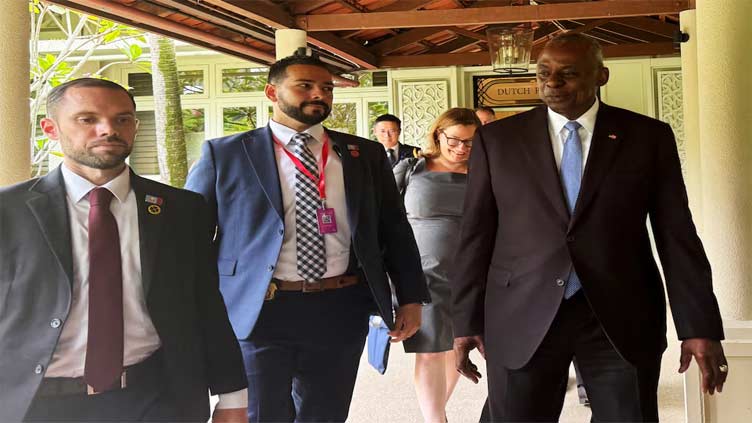US, China defence chiefs lock horns on Taiwan at Asia security summit

World
China claims sovereignty over almost all of the South China Sea
SINGAPORE (Reuters) - The US and Chinese defence chiefs locked horns on Taiwan in their first face-to-face meeting in two years on Friday, but both sides emphasised the need to keep military-to-military communications open.
US Defense Secretary Lloyd Austin and China's defence minister, Dong Jun, met in Singapore on the sidelines of Asia's premier defence summit, the Shangri-La Dialogue. The Philippines' president was to give a speech at the meeting later in the day that was expected to touch on sensitive South China Sea claims.
The US-China relationship is expected to loom over the dialogue, as are the wars in Ukraine and Gaza, and the South China Sea tensions.
During the meeting with Dong, Austin expressed concern about Chinese military activity near Taiwan, including after the island's presidential election and the inauguration of President Lai Ching-te this month, US Air Force Major General Patrick Ryder said in a statement.
"The secretary expressed concern about recent provocative PLA activity around the Taiwan Strait, and he reiterated that the PRC should not use Taiwan's political transition - part of a normal, routine democratic process - as a pretext for coercive measures," Ryder said after the 75-minute meeting.
He was referring to the People's Liberation Army and the People's Republic of China.
Dong warned Austin that the US should not interfere in China's affairs with Taiwan, defence ministry spokesperson Wu Qian told reporters.

The US approach to Taiwan violates commitments made by the United States and sends the wrong signal to "separatist forces" in Taiwan, the spokesperson quoted Dong as saying. Beijing calls Lai a "separatist".
Both sides, however, emphasised the importance of keeping military-to-military ties open, and a senior US defence official, speaking on condition of anonymity, said the meeting marked an "important step" in opening lines of communication.
The official said Austin was "firm but professional" and also brought up China's nuclear, space and cyber developments.
The two sides also discussed the South China Sea and the conflicts in Ukraine and Gaza.
Later on Friday the spotlight shifts to Philippine President Ferdinand R. Marcos Jr, who is expected to discuss the legal and geopolitical position of the Philippines on the South China Sea and note the importance of the waterway to global trade.
China claims sovereignty over almost all of the South China Sea, including parts claimed by the Philippines, Brunei, Malaysia, Taiwan and Vietnam, despite a 2016 ruling by the Hague-based Permanent Court of Arbitration that found Beijing's sweeping claims have no legal basis.
Taiwan's Defence Minister Wellington Koo told reporters in Taipei on Friday that increased tensions around the democratically governed island claimed by China as its own territory would diminish if Beijing's military drills ceased.
"If China stops its provocation and intimidation then peace and stability can be maintained," he said.
The region has seen a sharp uptick in such exercises in recent years, according to a report by the London-based International Institute of Strategic Studies (IISS) released on Friday.
Although both the United States and China have significantly increased the volume of military exercises across Asia, Beijing's drills still lag in scale and complexity, the study found.
The Shangri-La Dialogue, in its 21st iteration, is held every year in Singapore by IISS, gathering military and political leaders to discuss security issues. It ends on June 2.


